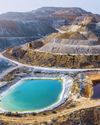
On April 14, 2023, a sleek rocket took off from Europe's Spaceport in French Guiana, in northeast South America. It blasted beyond Earth's atmosphere, soaring into the darkness of space. Onboard was a brand new space probe called the Jupiter Icy Moons Explorer, or Juice for short. Juice has an exciting trip ahead. It will travel through our solar system, with its sights set on reaching the planet Jupiter by July 2031. This probe will be so far from Earth-hundreds of millions of miles away—that it needs a 2.5-meter (8.2-foot) antenna to send information to us back home. It is also equipped with large solar panels to provide power. Once near Jupiter, Juice will embark on a planned four-year mission to study the planet and its mysterious icy moons: Ganymede, Callisto, and Europa.
Galileo Galilei (1564-1642) first spotted these moons along with Io (which isn't icy) in 1610. It seemed as if they were all too far from the Sun to have life. Space probes such as Galileo (1989-2003) and Cassini (1997-2017), however, have sparked fresh interest in the possibility of alien life on water-rich worlds. Galileo hinted at the existence of hidden oceans on Europa, Ganymede, and Callisto, and Cassini caught Saturn's moon Enceladus shooting water plumes into space.
Water Could Mean Life
Why is water such a big deal? "Scientists have spent decades looking for life in space, and they start by finding places with water," says Olivier Witasse. He is the project scientist for European Space Agency's Juice mission.
Bu hikaye Muse Science Magazine for Kids dergisinin March 2024 sayısından alınmıştır.
Start your 7-day Magzter GOLD free trial to access thousands of curated premium stories, and 9,000+ magazines and newspapers.
Already a subscriber ? Giriş Yap
Bu hikaye Muse Science Magazine for Kids dergisinin March 2024 sayısından alınmıştır.
Start your 7-day Magzter GOLD free trial to access thousands of curated premium stories, and 9,000+ magazines and newspapers.
Already a subscriber? Giriş Yap

A 12-Year-Old Girl's Election Sticker Is a Winner
VOTING IS A FUNDAMENTAL FREEDOM FOR AMERICANS, A MEANS OF DOING ONE'S CIVIC DUTY AND A WAY AN INDIVIDUAL CAN EXPRESS THEIR VOICE. In 1971, the United States lowered its voting age to 18. But that doesn't mean kids and teens under 18 can't participate in elections in various ways.

If everything the human brain does is basically sets of electrical impulses, how exactly does that translate into a state of mind?
You're not the only one asking this question. Every neuroscientist in the world is wondering the exact same thing, says Zach Mainen

EARTH'S TINIEST BUILDERS
THE HIDDEN WORLD OF MICROBES IN THE EARTH'S CRUST

MUMMIES SPEAK
ABOUT MICROBES, MIGRATION, AND MORE

GOING WITH YOUR GUT
HOW DO MICROBES AFFECT OUR HEALTH? LET'S COUNT THE WAYS...

BUG Detective
A burglar sneaks into a house on a quiet street in New York City. He walks through the house, touching countertops and door handles. Finally, he steals a single card from a full deck. Then he leaves.

Little Creatures Among Us THE MANY MICROBES IN OUR DAILY LIVES
When you think you're alone, you're actually not. In the ground, the air, your room, and even your body are Strillions and trillions of creatures so tiny you can't see them.

A Mars Rock Found With Leopard Spots Could Be a Sign of Ancient Life
IN JULY, NASA'S PERSEVERANCE ROVER CAME ACROSS A SPOTTED ROCK IN WHAT WAS ONCE A RIVERBED IN THE JEZERO CRATER ON MARS.

Para Athlete Uses Exoskeleton Suit to Carry the Olympic Torch
In July, a 36-year-old French tennis para athlete, Kevin Piette, got a chance to participate in this summer’s Olympic torch relay without using a wheelchair.

Ancient Egyptians May Have Used a Water System to Lift Stones to Build Pyramid
HOW ANCIENT EGYPTIANS BUILT THE MASSIVE PYRAMIDS IN EGYPT MORE THAN 4,000 YEARS AGO HAS LONG BEEN A TOPIC OF WONDER AND DEBATE.